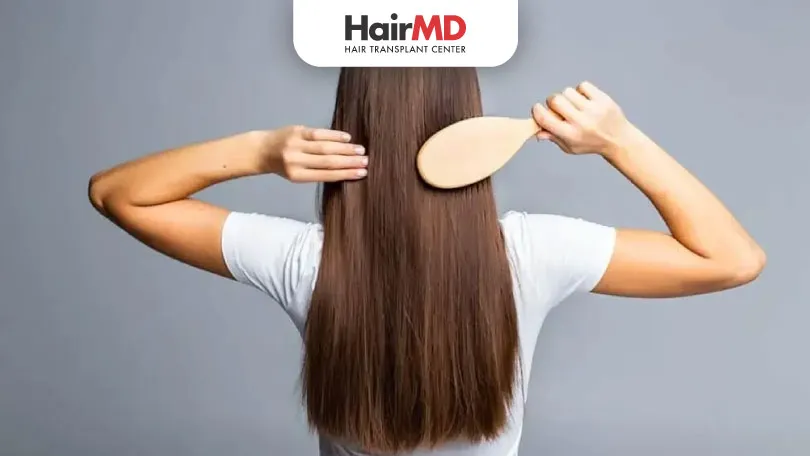
Curious if long hair causes thinning? Uncover the truth about long hair and hair loss, and learn effective hair care tips to keep your locks strong and healthy
Many people cherish the beauty of long hair, a common preference especially among women. Yet, there’s a widespread belief that long hair might lead to or exacerbate hair thinning. Is there any truth to this claim? Well, we are answering this question and many more in this upcoming blog.
What’s covered in the article?
- Does Long Hair Cause Hair Thinning?
- What is Hair Thinning?
- The Myth of Long Hair Causing Thinning
- When to See a Dermatologist?
- Conclusion
Does Long Hair Cause Hair Thinning?
Hair loss is a common hair condition where excessive hair falls due to disturbance in the natural hair growth cycle. The natural hair growth cycle comprises three phases; growth, rest, and fall respectively. Losing 50-100 hair strands each day is normal, but if the count goes up more than this, it is an abnormal hair loss. Many external and internal factors can lead to hair loss which may be reverted by treating the cause. Some causes cannot be reversed but slowed down if treated on time.
What is Hair Thinning?
Overthinking is an unproductive process where the mind continually thinks about happenings from the past or imaginary things to transpire shortly. While overthinking a person thinks too much and starts to worry. Does overthinking cause hair loss? Yes, if there is stress involved. Three types of hair loss are common in people with stress due to overthinking.
- Telogen Effluvium
A large number of hair follicles are pushed to the rest phase due to stress, this phenomenon is called Telogen Effluvium, where hair falls out easily while washing and combing.
- Traction Alopecia
While under stress, people pull out their hair from the scalp due to negative emotions taking over. This can lead to hair loss and may also cause permanent hair damage.
- Alopecia Areata
Due to stress, the immune system of the body may be triggered to attack the hair follicles, which can lead to patchy hair loss.
The Myth of Long Hair Causing Thinning
Hair loss due to overthinking can be reversed by managing the cause. Below are the ways to manage stress if your overthinking causes hair loss.
- Reduce Stress
The first step is to reduce stress by involving in relaxing activities like yoga, exercise, meditation, or any of your hobbies. You must go for a walk for peace of mind and avoid any stressful thinking.
- Be More Productive
You must not spend time thinking about the past or future whereas you must focus on living in the moment. You should keep yourself busy enough to not think too much which will give you better results in life and keep stress hair loss at bay.
Get an appointment with the nearest dermatologist to treat excessive hair loss on time.
When to See a Dermatologist?
Hair loss is a common hair condition where excessive hair falls due to disturbance in the natural hair growth cycle. The natural hair growth cycle comprises three phases; growth, rest, and fall respectively. Losing 50-100 hair strands each day is normal, but if the count goes up more than this, it is an abnormal hair loss. Many external and internal factors can lead to hair loss which may be reverted by treating the cause. Some causes cannot be reversed but slowed down if treated on time.
DO YOU KNOW?
Nearly 250 Patients Visit HairMD
Everyday For Various Hair Concerns
(15+ Years Of Expertise. 4157+ Successful Hair Transplant)
Meet Our Dermatologists
Conclusion
While overthinking alone may not directly cause hair loss, the stress and anxiety associated with it can contribute to hair shedding over time. Managing stress through relaxation techniques, a balanced lifestyle, and seeking professional help when needed can reduce the impact on your hair health. Taking proactive steps to maintain your mental and physical well-being will not only protect your hair but also improve your overall quality of life.
Further Reading
17 Post Hair Transplant Care Tips | ISHRS Surgeon Guide 2026
Expert repair surgery for botched hair transplants in Pune. Correct unnatural hairlines, scarring, and low graft survival safely.
Body Hair Transplant (BHT) in 2026: Using Beard and Chest Hair to Fix a Bald Scalp
Expert repair surgery for botched hair transplants in Pune. Correct unnatural hairlines, scarring, and low graft survival safely.
2026 Guide to Fixing a Failed Hair Transplant | Revision Surgery Pune
Expert repair surgery for botched hair transplants in Pune. Correct unnatural hairlines, scarring, and low graft survival safely.
Correcting the ‘Corn-Row’ Look: How We Fix Bad Transplants in 2026
Specialised repair surgery in Pune for corn-row hairlines, poor angles, and failed graft placement. Surgeon-led correction.
Have thoughts? Please let us know
We are committed not only to treating you, but also educating you.










